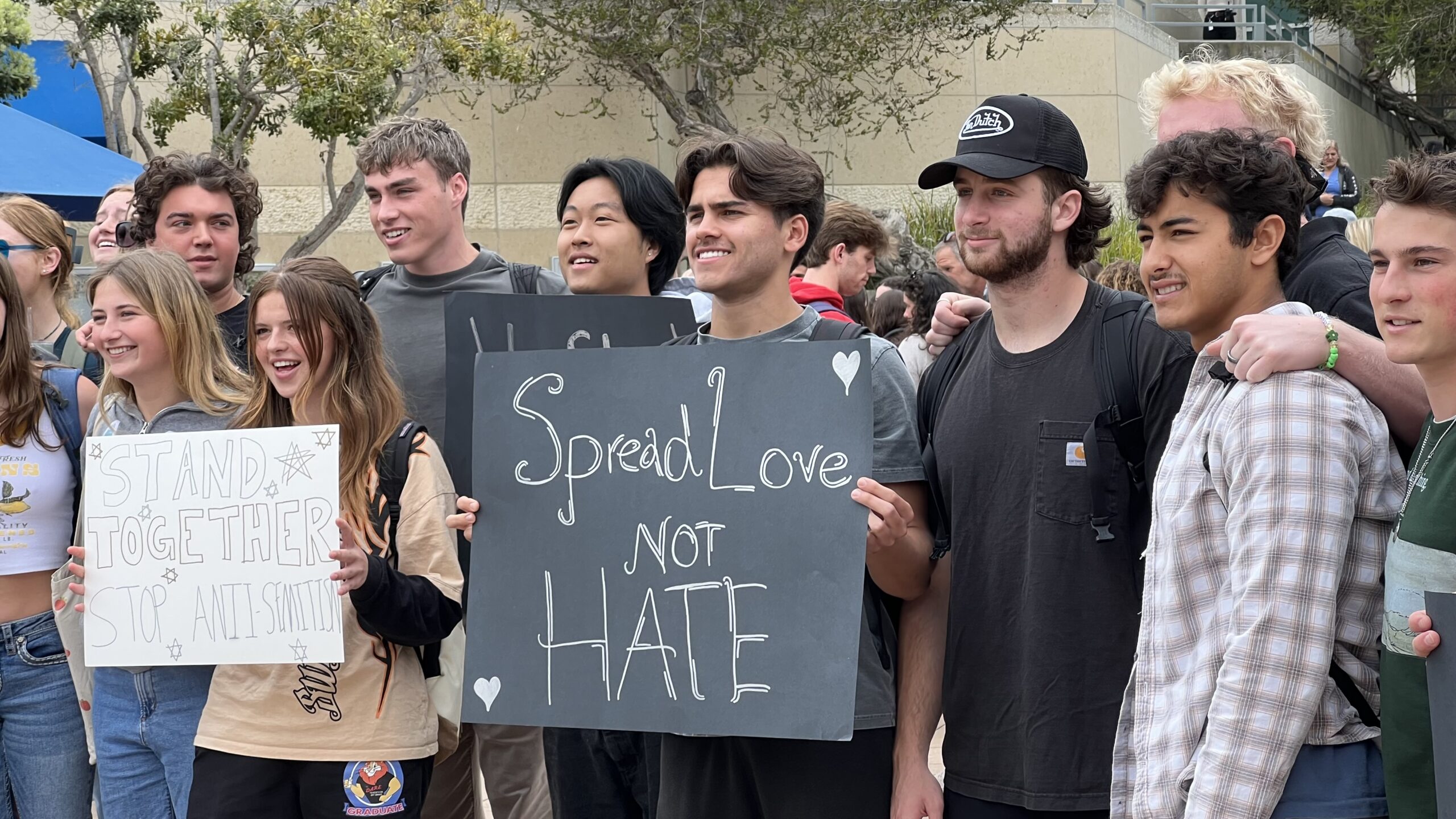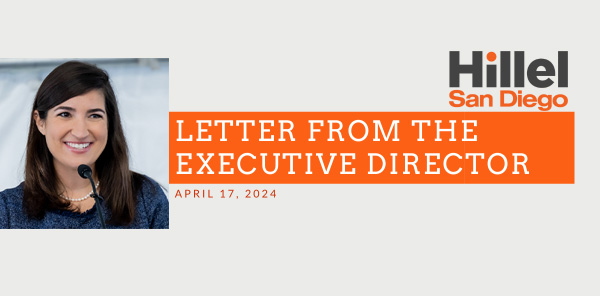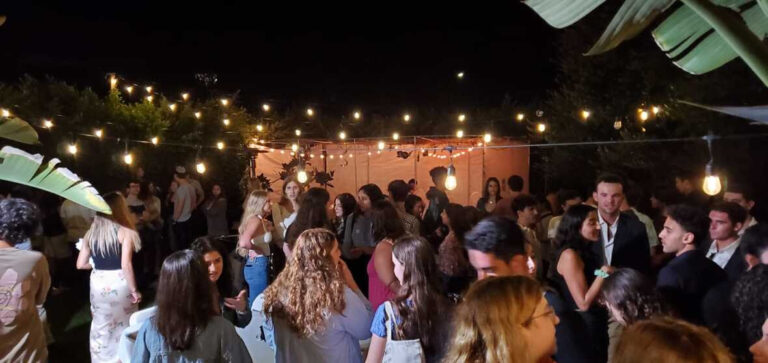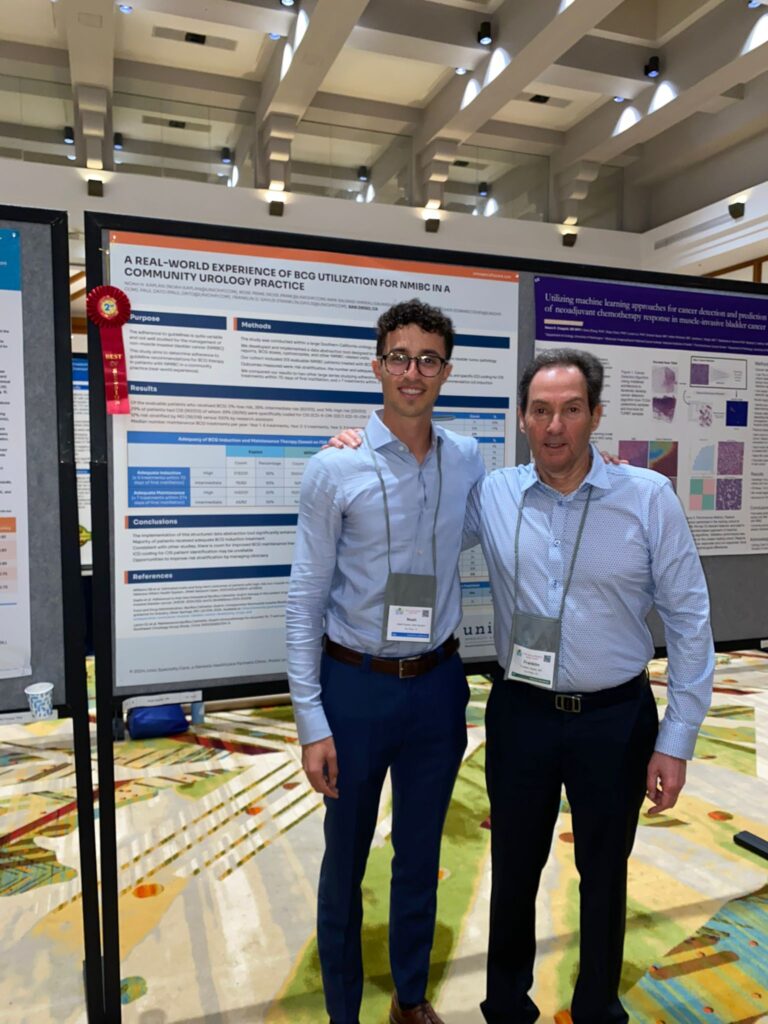On the last day of the San Diego Jewish Federation’s CommUNITY trip to Israel, as I made my way through the halls of the new Anu Museum of the Jewish People – traversing 2,000 years of Jewish history within one hour – my phone buzzed incessantly with Red Alerts warning of rockets flying from Gaza into Israel and WhatsApp messages from the Hillel team in San Diego contending with antisemitic vandalism and anti-Israel hate on campus at UCSD.
In that moment, the deep connection between our shared experiences in Israel and the escalating tensions faced by our Jewish students during that same week became clear to me. We are one people, bound by history, heritage, and an unbreakable bond that grows stronger in the face of adversity.
Last week’s defacement of a UCSD residential hall bathroom with swastikas made of human feces shocked us all. While the university’s investigation to identify the culprit is ongoing, it is impossible to overlook the connection between the appearance of these heinous symbols and the climate of anti-Israel demonization perpetuated by a small, but loud group of activists on campus.
The annual “Justice in Palestine Week” sponsored by Students for Justice in Palestine (SJP) featured several incendiary speakers – one each day last week – who promoted the radical view that the Palestinian people should reclaim the entire land of Israel with pre-1948 borders, “from the river to the sea.” We’re so used to hearing this kind of rhetoric on campus that we can become inured to it. But how else can one hear this other than as a call for the annihilation of the Jewish state?
During the community trip to Israel, we heard from prominent Israeli-Arab journalist, Khaled Abu Toameh, who writes for the Jerusalem Post. He explained how he used to give talks on American college campuses, but no more. The leading pro-Palestinian activists on campus, he assessed, aggressively promote ideas that are on the radical fringe even within the Palestinian communities living in the West Bank and Gaza. He lamented that these student activists hold the extremist position of anti-normalization, which means they refuse to speak with fellow students if they happen to be Jews or refuse to reject Zionism. “Their hatred for Israel and what it stands for has blinded them to a point where they no longer care about the real interests of the Palestinians,” he wrote in 2009, and very little has changed since then.
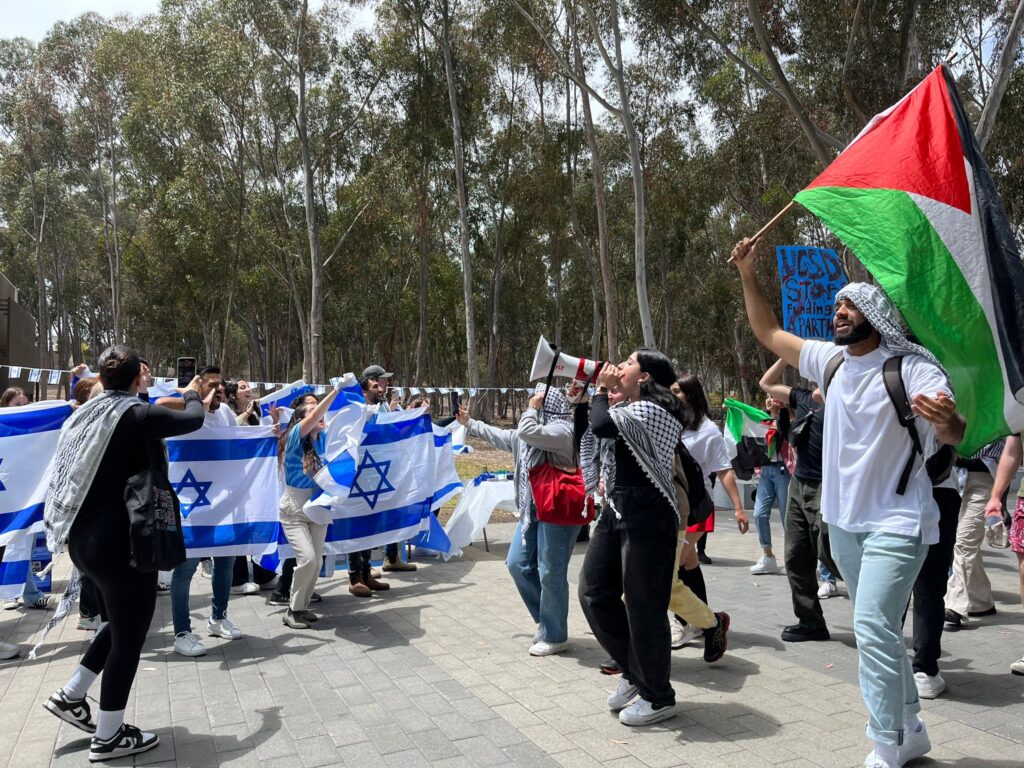 The anti-Israel activism on campus contributes to an atmosphere of hatred and hostility toward Jews – even if activists are careful to use the words Zionist and Israel as proxies. Every year at this time, we are used to seeing the large wall erected by SJP in the center of campus featuring cartoonish images that make spurious claims against Israel and Jews. As if that wasn’t enough, they also marched across campus in commemoration of the “Nakba” and made sure that their route would pass directly through the Hillel booths on Library Walk where Jewish student leaders were draped in Israeli flags.
The anti-Israel activism on campus contributes to an atmosphere of hatred and hostility toward Jews – even if activists are careful to use the words Zionist and Israel as proxies. Every year at this time, we are used to seeing the large wall erected by SJP in the center of campus featuring cartoonish images that make spurious claims against Israel and Jews. As if that wasn’t enough, they also marched across campus in commemoration of the “Nakba” and made sure that their route would pass directly through the Hillel booths on Library Walk where Jewish student leaders were draped in Israeli flags.
For some students, the environment on campus during this week is so traumatizing that they avoid campus and skip classes for the week. They carry the weight of these acts of hate, feeling targeted, marginalized, and harassed within their own academic community. Hillel is there to support every single student during this difficult time.
“The last two weeks have had a lot of mixed emotions. It was very frustrating to see what happened in the bathroom at Sixth College and my first reaction was that I couldn’t believe it – it only seems like something you would see in a horror movie. And then to have apartheid week follow that event did not help at all…. The support from Hillel and the broader Jewish community had been extremely warming and uplifting. The group therapy session done at Hillel is just one example of how Hillel always cares and supports its students.” -Johnathon Lalouz UCSD ‘23
There are two crucial things that give us hope.
First, the Triton Jewish Leaders, Hillel’s premier student leadership group at UCSD, has shown admirable resiliency and determination in the face of this ugliness. With the support of Hillel of San Diego staff, particularly our Jewish Agency for Israel Campus Israel Fellow Dar Halevy Feldman, they have taken a stand. Students filed official reports and demanded action from the university administration, which has responded with a strong statement of support for Jewish students. They also issued a public letter to the administration signed by dozens of student organizations, individuals and community partners. All week, they set up tables on Library Walk with educational materials to help educate their peers who otherwise are mystified by the anti-Israel rhetoric.
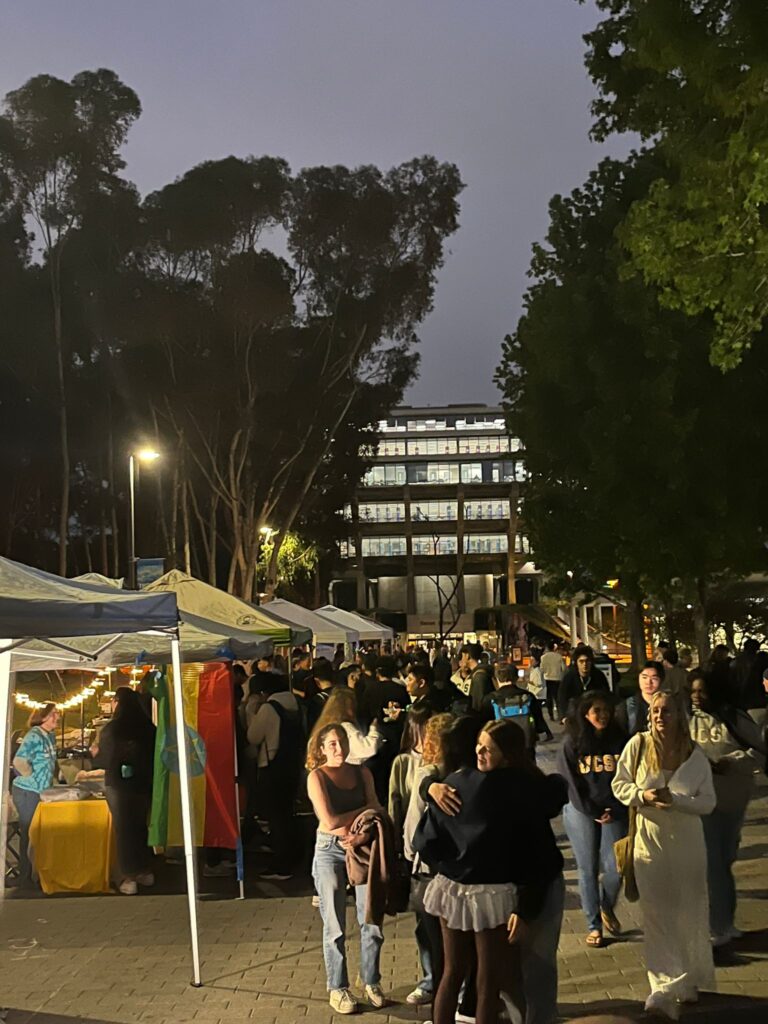
And this week, students worked tirelessly to produce “Israel Peace Week” as an uplifting response to the negativity of the prior week. They organized a lecture by Yoseph Hadadd on life in Israel as an Arab, and they hosted a festive Israeli Night Market on Library Walk for an extraordinary Israeli shuk experience visited by hundreds of students on Wednesday.
Second, in perhaps the most inspiring moment of the week, on Monday, more than 200 students joined a rally and marched across campus in solidarity with Jewish students. The organizers were a group of non-Jewish student leaders who decided enough was enough.
One of the student organizers of the rally shared:
“After the occurrences on campus, everyone in the Sorority & Fraternity Life community felt the need to show our support for the Jewish community at UCSD. We wanted to send a message that hate and discrimination have no place on our campus and stand behind those in our community who were affected. The walk was organized in order to promote a message of acceptance and encourage those who attended or witnessed the walk to educate themselves and actively contribute to a more tolerant and loving community.”
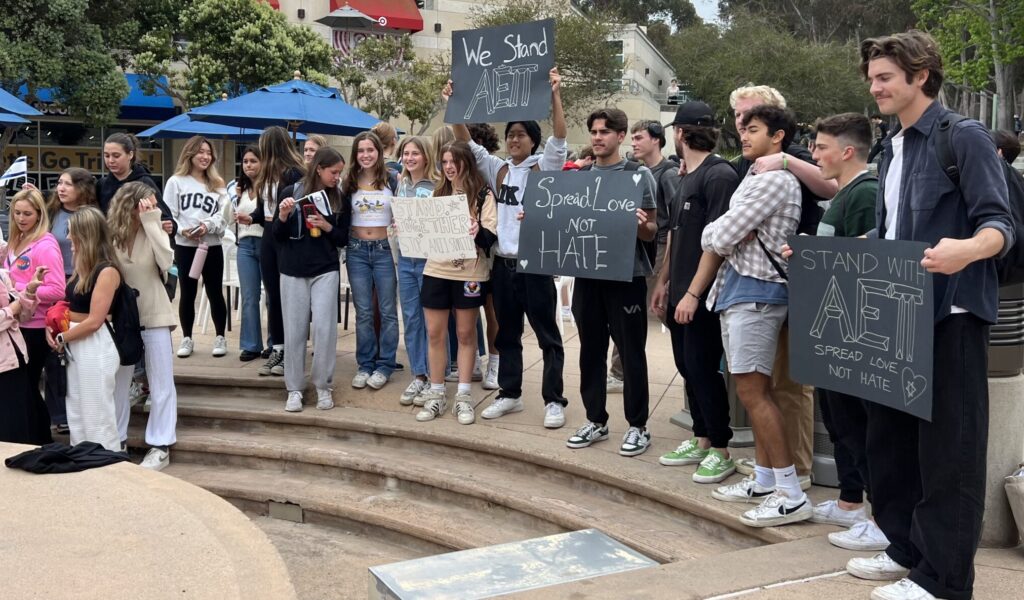
Another one of the organizers of the march is a student who traveled with Hillel on our recent Fact Finders Mission, designed to bring top campus leaders of all faiths and ethnicities to Israel and the Palestinian Territories to learn about the conflict first-hand. Participants on this trip come back to campus with the understanding that the anti-Israel activism they may have once supported or were indifferent to is actually an extremist movement antithetical to the values of the campus community.
And now, for the first time, several student groups traditionally aligned with SJP have severed ties with them over their anti-normalization stance. After years of consistent outreach and coalition building, Jewish students can now proudly say they have allies on campus. This is a monumental shift, and it may presage a sea change in how Jewish students and Israel are viewed on campus. In fact, we were surprised to see that SJP’s guest speakers attracted small audiences of fewer than 100 people, and their “Nakba” march had far fewer participants than the rally for solidarity with Jewish students.
Lastly, the Beverly & Joseph Glickman Hillel Center is living up to the vision of Joseph “Chickie” Glickman (z”l), who was adamant that the building be used as a venue for Jewish students to host their non-Jewish peers as guests at Shabbat dinners and other programs in an effort to build bridges and reduce antisemitism. This is exactly what we are seeing, and we thank him for that extraordinary legacy.
Reflecting on these last two weeks, Jewish students are emotionally exhausted but also feel well-supported by Hillel and the broader community.
“The last couple of weeks at UCSD have been extremely stressful and challenging. I’ve never faced anything to this degree of hatred. The direct support I’ve received from Hillel and the surrounding Jewish community has kept me afoot and shown me the friendships that are rooted in our culture. I’m very thankful to have this community who has always been there for each other.” – Elanit Leiter UCSD ‘27
Despite the emotional exhaustion, Jewish students find solace in the unwavering support of their San Diego Jewish community. In the face of adversity, the unbreakable bond among the Jewish people prevails, fostering resilience, hope, and a determination to create a more tolerant and inclusive campus community.
Michael Rabkin is the former Executive Director for Hillel of San Diego and current Campus Support Director for Hillel International.

